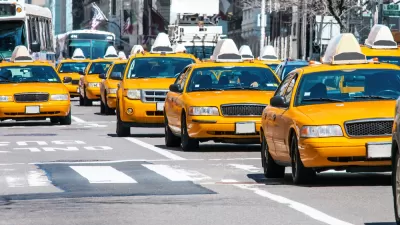New York City is considering a cap on the number of new for-hire drivers (including transportation network companies) while the city studies the impact of for-hire vehicles on the city's congestion.
According to an article by Johana Bhuiyan, "the city council and Mayor Bill de Blasio’s administration have proposed a yearlong freeze on growth of all for-hire vehicle companies while the city conducts a study of traffic patterns, congestion, and air quality."
"In Uber’s case, the cap would limit the ride-hail giant to just 201 new drivers for the year," adds Bhuiyan.
The article's analysis covers two of the implications of the proposed policy: first is the possibly crippling effect the cap on drivers would have on Uber's business, and the second is the possibly faulty logic about congestion that inspired the policy proposal.
On that latter issue, Bhuiyan cites data from a city report published last year [pdf], which found variations in traffic speed by about one mile per hour dating back to the year 2007. "Though traffic did decrease in 2014, perhaps this was a return to the city’s norm of 2007, rather than a clear linear downward pattern," writes Bhuiyan.
Bhuiyan also quotes Uber spokesperson Matt Wing to speculate that New York's political leadership is being less than honest about ht emotivations for the new policy. Wing states: "The de Blasio administration is pushing a policy to cap Uber that is contradicted by their own data….Given this information was conveniently left out of the city’s proposal, can anyone honestly still say their motivation is solving congestion?"
In 2014, Seattle implemented a similar cap on the number of drivers that transportation network companies like Uber, Lyft, and Sidecar could hire. City officials rescinded the policy just a month after approving the cap.
FULL STORY: A New For-Hire Vehicle Cap In New York Could Devastate Uber

Planetizen Federal Action Tracker
A weekly monitor of how Trump’s orders and actions are impacting planners and planning in America.

San Francisco's School District Spent $105M To Build Affordable Housing for Teachers — And That's Just the Beginning
SFUSD joins a growing list of school districts using their land holdings to address housing affordability challenges faced by their own employees.

The Tiny, Adorable $7,000 Car Turning Japan Onto EVs
The single seat Mibot charges from a regular plug as quickly as an iPad, and is about half the price of an average EV.

Seattle's Plan for Adopting Driverless Cars
Equity, safety, accessibility and affordability are front of mind as the city prepares for robotaxis and other autonomous vehicles.

As Trump Phases Out FEMA, Is It Time to Flee the Floodplains?
With less federal funding available for disaster relief efforts, the need to relocate at-risk communities is more urgent than ever.

With Protected Lanes, 460% More People Commute by Bike
For those needing more ammo, more data proving what we already knew is here.
Urban Design for Planners 1: Software Tools
This six-course series explores essential urban design concepts using open source software and equips planners with the tools they need to participate fully in the urban design process.
Planning for Universal Design
Learn the tools for implementing Universal Design in planning regulations.
Smith Gee Studio
City of Charlotte
City of Camden Redevelopment Agency
City of Astoria
Transportation Research & Education Center (TREC) at Portland State University
US High Speed Rail Association
City of Camden Redevelopment Agency
Municipality of Princeton (NJ)



























